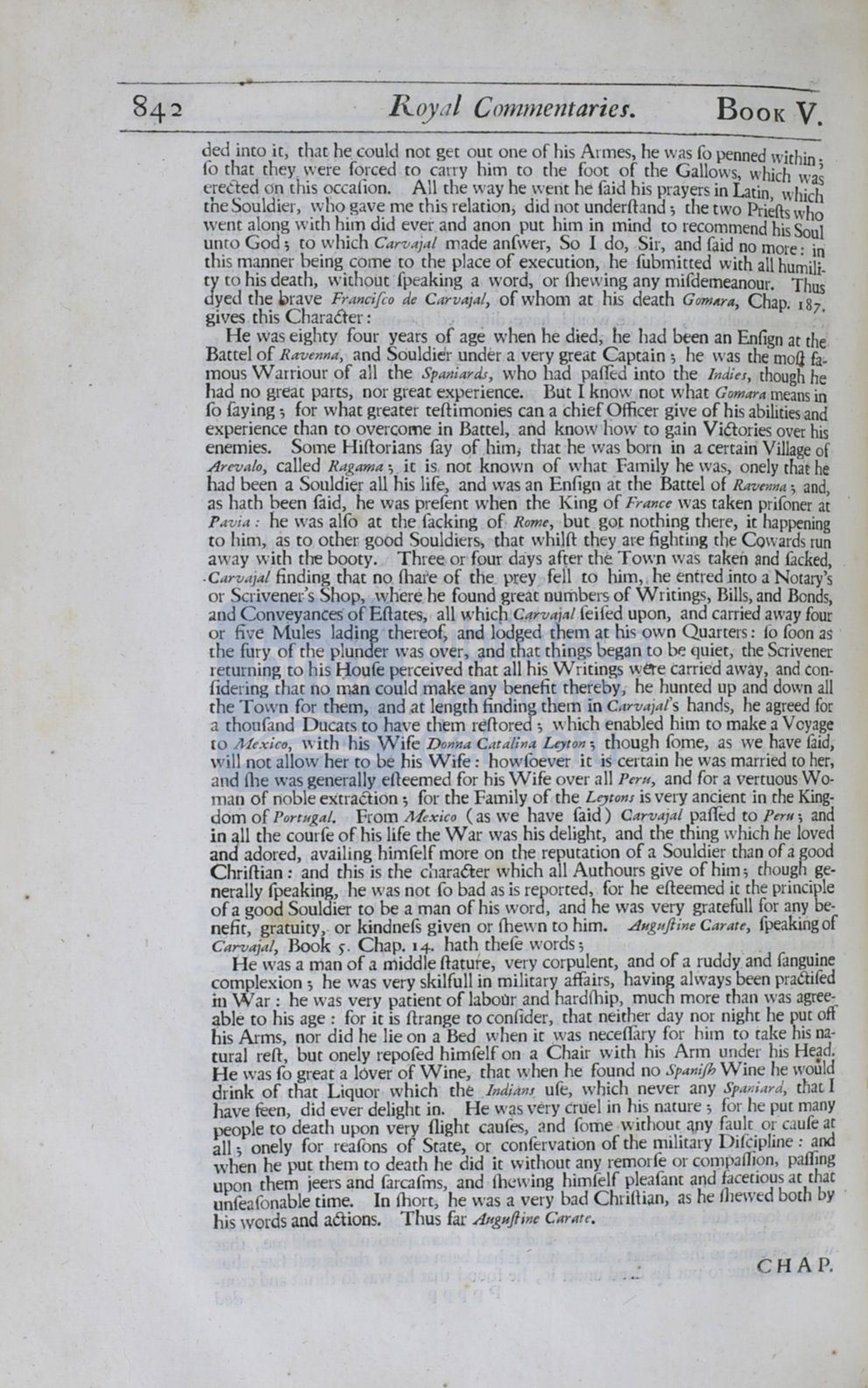

Royal
Commentaries.
BooK
V.
ded into ic, that he could not get out one of his Armes, he was fo penned within.
fo
that they,
~ere
forced to
carry
him to the foot of the Gallows,
which
"~
reded on this occafion.
All
the way he
went
he
fajd
bis prayers in
Latin
whi
h
the Souldier, who gave me this relation, did not underfiand ; the two
Pri~Cl:s
wh
went aloqg with
h~m
did
ev~r
and anon put him in
min~
co recommend his
Soul
unto God;
to
which
Carva;al
made anfwer, So
I
do,
Su,
and faid no more. ·
this manner being come to the place of execution, he fubmitted wich
all
hu~U~
cy
to
his death, "ithout fpeaking a word, or !hewing any mifdemeanour.
Thus
dyed the brave
Francifco de Carvajal,
of whom at his death
G011Mra
Chap
1
g
7
gives this Charaeter:
'
·
·
He was eighty four years of age when he died, he had been an
Enfign at the
Battel of
Ra_venna,
and Souldier _under a very great Cap.rain ; he was the
mofl
fa–
mous Warnour of all the
Spamards,
who
baa
paffi d into the
Indies,
though
he
had no great parts, nor great experience. But
I
know not what
Gomara
means
in
fo
faying; for whac greater tell:imonies can a chief Officer
give of
his abilities
and
experience than
to
overcome in Battel, and know how to gain Vietories over
his
enemies.
Some HHl:orians fay of him, drat he was born in
a
certain
Village of
Arevalo,
called
Ragama; .
it
is. not known of
~hat
Family he wa , onely
chat
he
had been a Souldier all his life, and was an Enfign at the Battel of
&venna
;
and
as hath been faid, he was prefent when the King of
France
was taken prifoner af
Pavia:
he was alfo at the facking of
Rome,
but got nothing there,
it
happening
to him, as to other good Souldiers, that whilfi they are fighting the Cowards run
away with
the
b9oty. Three or four days
after
the Town was taken and facked,
-Carvajal
finding that no iliai'e of the prey fell to him, he entred
into a
Notary's
or Scrivener's Shop, where he found great m1mbers of Writings,
Bills,
and Bonds,
and
Conv~yances
of Efiates, all whicp
Carvajal
feifed upon, and carried away
four
or five Mules lading thereof, and lodged them at
hi
own Quarters:
fo
foon as
the fury of the plunder was over, and that things began to
be
quiet, the Scrivener
returning
to
his
~oufe
perceived that all his Writings wl'te carried away, and con–
fidering that no
man
could make any benefit thereby, he hunted up and down
all
the Town for them, and at length finding them in
Carvajat's
hands, he agreed for
a thonfand Ducats to have
them
refiored; which enabled him co make aVoyage
co
Mexico,
with
his Wife
Donna Catalina
Le;yton;
though fome, as we have faid,
will
not allow her
to
be his W.ife: howfoever
it
is certain he was married
co
her,
and fhe was generally efieemed for his Wife over
all
Peru,
and
for a
vertuous
W
o–
man
of
noble extraetion ;
for
the Family of the
Leytom
is very ancient in
the King–
dom
of
Portugal.
From
Mexico
(as we have faid)
Carvajal
pa«ed
to
Per11;
and
in all
the courfe of his life the
War
was his delight, and the thing which he loved
and adored, availing himfelf more on the reputation of
a
Souldier than of
a
good
Chrifrian: and this is the cbaraeter which all Authours give of
him;
though
ge–
nerally fpeaking, he was not
fo
bad as
is
reported, for he efieemed
it
che principle
ofa good Souldier to be a man of
his
word, and he was very gracefull for
a~y
be–
nefit, gratuity, or kindnefs given or fhev:, n to him.
.LlHguftine Carate,
fpeakmg
of
Carvajal,
Book
5"·
Chap.
14.
hath thefe words;
He was a man of a middle fiature, very corpulent, and of a ruddy and fanguine
complexion; he was very skilfull in military affairs, having always been prattifed
in
War : he was very patient of labour and hardfhip, .much more than was agree–
able to his age
:
for
it
is firange co conilder, that neither day n<?r night he
p~t
off
his Arms, nor did he
lie
on a Bed when
it
.was neceffary for him
to
rake
hlS
aa–
cural refi, but onely repofed himfelf on a Chair with his Arm
un~er
his
He~d.
He was fo great a lover of Wine,, that when he found no
Spanijh
Wme he would
drink
of
that Liquor which the
JndianJ
ufe,
wh~ch ~ever
any
Spaniard,
that
I
have reen, did ever delight
in.
He
W?S
very cruel
m h_1s
nature ;
for
he put many
people
co
death upon very ilight caufes,
nd
.fame
icho~c.
any
fa~lr. o~
c ufe
ac
all ;
onely for reafons of State, or confervauon of the military D1fciphne
:
and
when
he
put them to death he did
it
without any remorfe or
compaai~:m,
paffing
upon them jeers and farcafms, and ilicvving himfelf
pl~afam
and facenous at that
unfeafonable time.
In
iliort, he was a very bad Chnlhan, as
he
fl1e\1t
ed
both
by
hi
words and
actions. Thus far
Auguj/-ine C11r11te.
CHAP.














